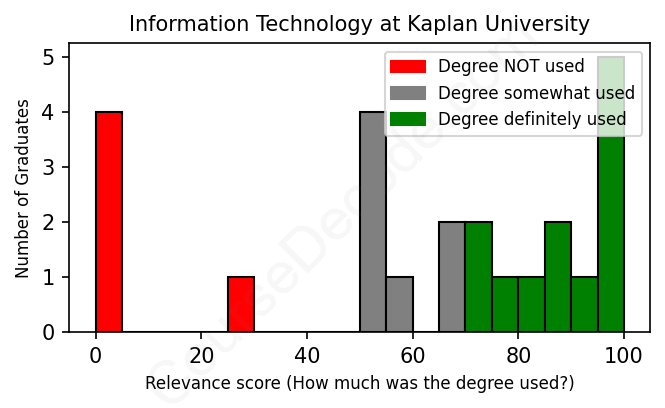
First, some facts. Of the Information Technology graduates from Kaplan University we've analyzed , here's how many have used (or NOT used) their degree in their career:

These are estimates based on AI analysis of 24 LinkedIn profiles (see below).
The verdict? Below average. Overall, with an average relevance score of 61%, Information Technology graduates from Kaplan University have a lower likelihood (-6%) of finding work in this field compared to the average graduate across all fields:
And for comparison, here's the chart for all profiles we've looked at across all degrees.
Also, after graduating, only 25% of these graduates have pursued further education other than another Bachelor's degree (such as a Masters degree or other), compared to the average across all profiles of 35%. This suggests a Bachelors degree is enough for most Information Technology graduates, and it's normal to look for work straight after graduation.
See the details:
|
Relevance score: 57% We think this person has gone into a career only somewhat relevant to their degree. We think this person has gone into a career only somewhat relevant to their degree.
DEGREE INFOGraduated in 2017 from Kaplan University with a Bachelor's degree in Information Technology. No other secondary education since. JOB HISTORY SINCE GRADUATIONIT Support Specialist - Implementer Schulte Supply Inc. Apr 2018 - Apr 2019 Customer Service Representative  HawkSoft, Inc. May 2019 - Present ABOUTNo information provided. |
The top 10 most common jobs done by the graduates we've analyzed (ranked most common to least) are:
When looking at jobs held by graduates from Kaplan University with degrees in Information Technology, it’s clear there’s a mix of roles when it comes to how closely related these jobs are to IT. Many have landed positions like Systems Engineer, NOC Technician, and various roles in information security and network administration. These jobs make good use of the technical skills and knowledge that come with an IT degree, showing a strong connection between education and job functions. It seems that a lot of graduates steer toward positions where they can directly apply what they learned about systems, networks, and cybersecurity.
However, not all paths taken by these graduates are directly tied to technical work. Several have ventured into fields like project management, customer service, and even roles in operations and logistics that don’t really utilize their IT background to its full capacity. Positions like Buyer/Planner and Production Control Manager pop up often, reflecting a tendency to step outside of strict IT roles, which means that for some, their degree might not be the key to their career. Overall, while many graduates are thriving in relevant IT positions, there’s a noticeable number who have drifted into less technical fields. Balancing both these trends, it’s safe to say that while a solid portion of Kaplan University’s IT grads are in related jobs, a significant number are exploring different career avenues that dilute the relevance of their IT education.
Here is a visual representation of the most common words in job titles for Information Technology graduates (this is across all Information Technology graduates we've analyzed, not just those who went to Kaplan University):

From looking at the job trajectories of graduates from Kaplan University with degrees in Information Technology, it seems like there’s a mix of outcomes. When you check out their first jobs after graduation, many of them dive right into technical roles like IT Specialists, Systems Administrators, or Field Technicians. This initial entry into the workforce definitely leans toward relevant positions in technology, which is promising since it suggests that they are able to apply what they've learned in their studies right away. For instance, some even land jobs with reputable companies like Yahoo or become Software Engineers shortly after graduating.
Fast forward five to ten years later, and it looks like these grads tend to solidify their foothold in the tech industry, moving into more advanced positions like Senior Network Engineers or Information Security Engineers. Many of them progress into roles that carry more responsibility and specialization, which is great for career growth. However, there are also some who have drifted away from traditional IT roles, taking paths into business operations or even education as adjunct instructors. Overall, it looks like a decent chunk of these graduates are finding their way in successful careers related to Information Technology, but there are definitely some who have ventured outside the field as well. So while there’s a solid foundation for tech careers, there is some variability in how these paths unfold!
Honestly, a Bachelor’s degree in Information Technology can be challenging, but it's not impossible, especially if you have a knack for tech and problem-solving. At Kaplan University, like many places, you’ll definitely dive into some complex topics like programming, networking, and database management, but the coursework is often designed to be pretty manageable. You’ll likely have a mix of hands-on projects and theory, which can make things interesting. If you’re dedicated and stay organized, it’s totally doable! Just be ready to put in some effort, and you should be fine.
Most commonly, in the LinkedIn profiles we've looked at, it takes people 2 years to finish a Bachelor degree in Information Technology.
Alright, so when you look at these grads from Kaplan University, it seems like some of them are doing pretty well in terms of pay, while others... not so much. Like, graduates who got roles as Systems Engineers, Network Administrators, or Information Security Engineers tend to have jobs that typically offer decent salaries, especially since they’ve climbed the ladder over the years. But you have some others stuck in roles like Customer Service or Admin stuff that might not be raking in the big bucks. Overall, it's a mixed bag—some are likely pulling in solid paychecks while others might still be working their way up the financial ladder. So, if they keep pushing forward and gaining experience, there's definitely hope for a better paycheck down the line!
Here is a visual representation of the most common words seen in the "about" section of LinkedIn profiles who have a Bachelor degree in Information Technology (this is across all Information Technology graduates we've analyzed, not just those who went to Kaplan University). This may or may not be useful:

Here are all colleges offering a Bachelor degree in Information Technology (ordered by the average relevance score of their Information Technology graduates, best to worst) where we have analyzed at least 10 of their graduates: